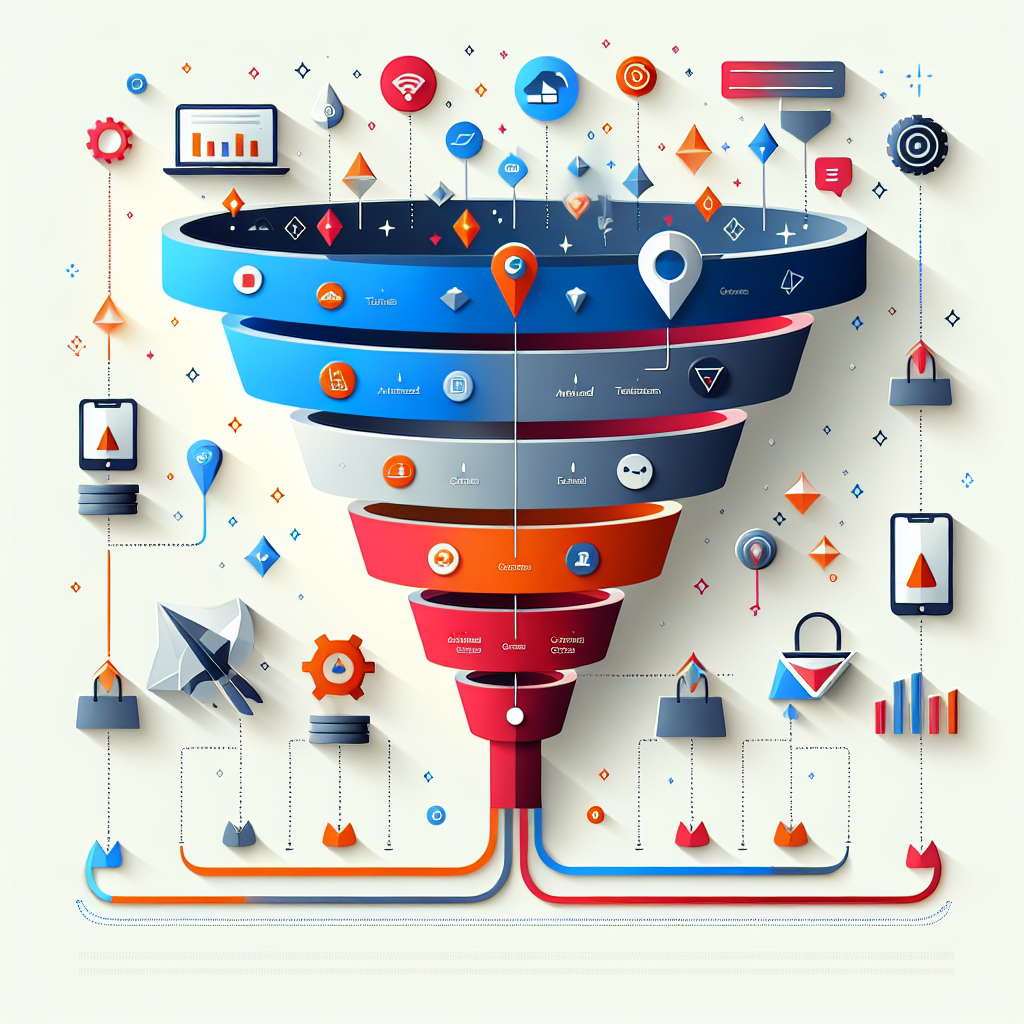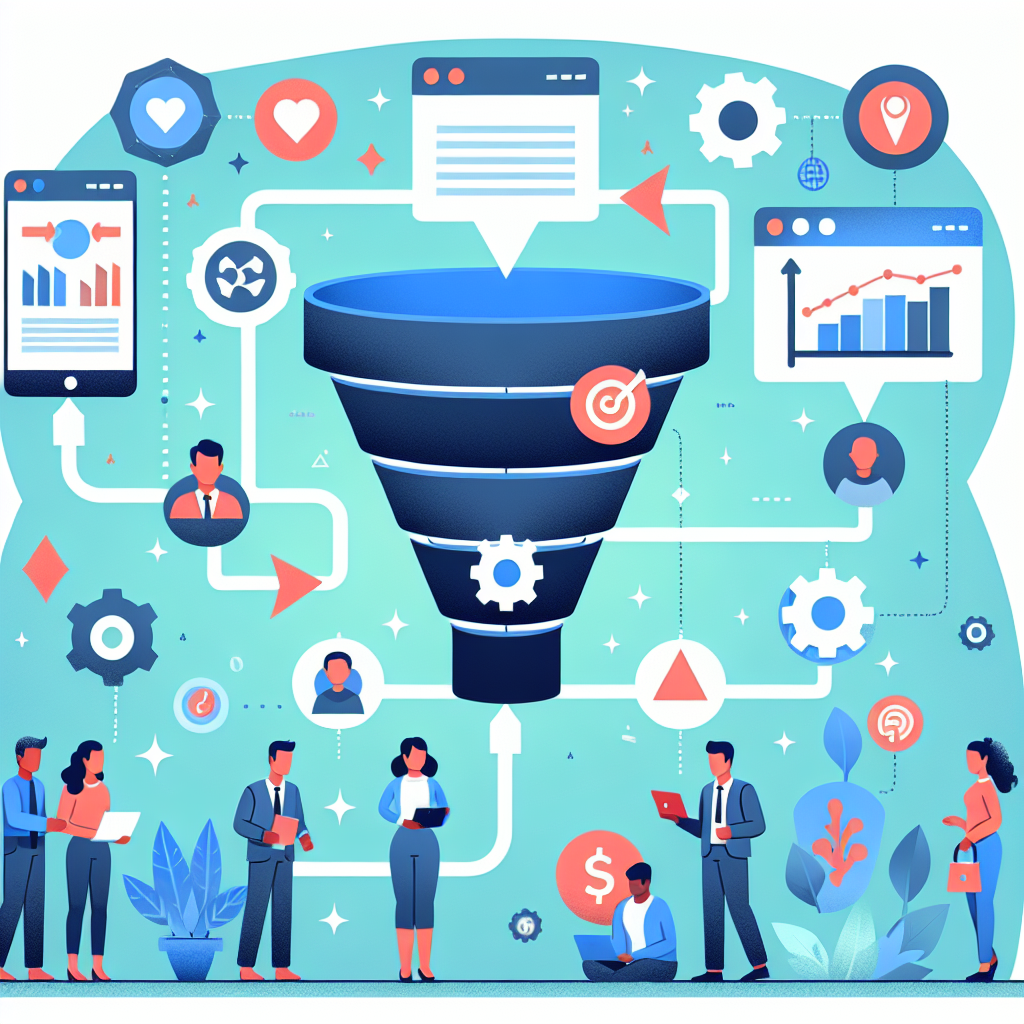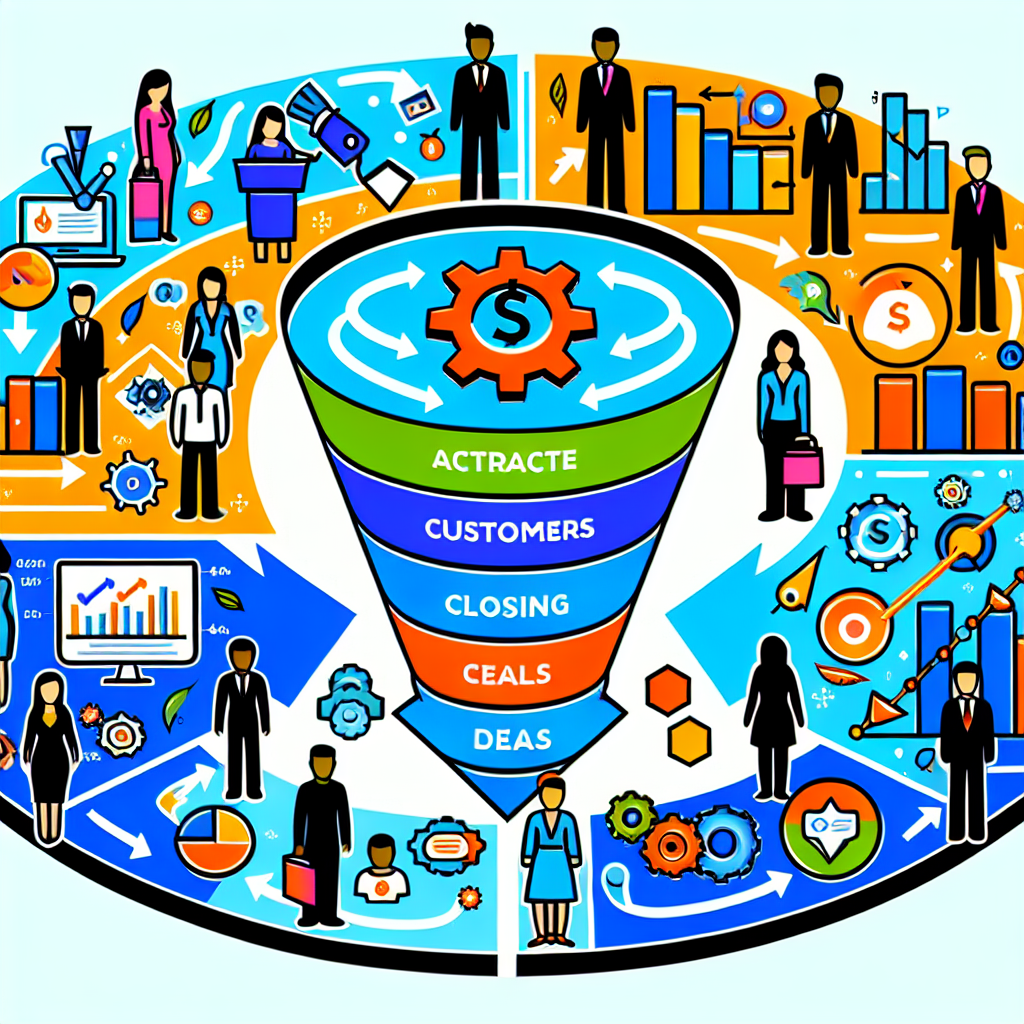Maximize Sales Conversion with Our Innovative CRM Systems and Lead Funnels Development

What are Funnels in CRM? Discover Their Impact on Your Sales Strategy

What are funnels in CRM? Imagine your sales process as a smooth pathway, guiding prospects from initial interest to the final purchase. This pathway is what we call a sales funnel. In the world of Customer Relationship Management (CRM), funnels help you visualize and optimize this journey, ensuring no potential lead slips through the cracks. A well-defined sales funnel can significantly enhance your overall strategy, leading to more conversions and increased revenue. ⭐
The Structure of a Sales Funnel
A typical sales funnel comprises several stages, often including:
- Awareness: The potential customer becomes aware of your product.
- Interest: The lead shows interest by engaging with your content.
- Consideration: They weigh your offerings against competitors.
- Intent: The customer expresses intent to buy.
- Purchase: The prospect makes a purchase.
Understanding these stages is crucial. For instance, a retail business may notice a drop-off after the consideration stage. By analyzing this, they could enhance their marketing tactics to boost customer interest and reduce abandonment.
Why are Funnels Important?
Sales funnels are key because they help businesses streamline their sales process. They not only clarify how leads are progressing but also pinpoint where difficulties arise. What is a lead funnel? It’s a specific type of sales funnel focused on nurturing contacts until they are ready to make a purchasing decision. This tailored approach maximizes your chances to convert leads into satisfied customers.
Statistics show that businesses using a structured CRM for sales experience an average sales increase of 29%. ⭐ Not to mention, companies that actively manage their sales funnels can improve their conversion rates by as much as 50%. These figures make a compelling case for implementing an effective CRM strategy!
How Does CRM Affect Your Funnels?
Utilizing a CRM system helps manage your sales funnels by tracking leads in real-time, analyzing behavior, and automating follow-ups. This means your sales team can dedicate their time to high-priority leads rather than administrative tasks. When is CRM needed? When you notice that onboarding new leads or converting existing ones requires more manual effort than youd like, that’s your cue! ⭐
Consider the story of one of our clients, a local cafe, that struggled with inconsistent customer engagement. After implementing a CRM to manage their sales funnel, they identified that customers would often drop off after the initial visit. By using targeted follow-ups and promotions for their loyalty program, they increased repeat visits by 40% over six months! ⭐
Expert Strategies to Enhance Your Sales Funnel
Here are some actionable tips for maximizing your sales funnel:
- Regularly assess each funnel stage to identify bottlenecks. ⭐
- Engage with leads through personalized communication. ⭐
- Automate follow-ups to ensure no lead goes unnoticed.
- Leverage data analytics to understand customer behavior.
- Utilize CRM tools to streamline customer interactions.
By continuously refining your strategies, you can effectively increase conversion in sales and enhance customer satisfaction.
Conclusion
Ready to take your sales funnel to the next level? Order our Autov funnel sales development and promotion service today! With our 20 years of experience, professional specialists, and a guarantee, we’re dedicated to supporting your business growth. ⭐ Contact our customer relations manager, Alexandra, at [email protected] or visit us at artivale.com to get started!
Frequently Asked Questions
- What are funnels in CRM? Funnels in CRM illustrate the stages a lead goes through before becoming a customer.
- What is CRM for sales? CRM for sales refers to software that helps manage sales processes by organizing customer data and interactions.
- When is CRM needed? CRM is essential when businesses want to scale and effectively manage customer relationships.
- What is a sales funnel? A sales funnel is the journey prospects take from initial awareness to making a purchase.
- What is a lead funnel? A lead funnel highlights the process of nurturing leads until they are ready to purchase.
- How to increase conversion in sales? Enhance customer engagement and automate follow-ups to boost conversion rates.
- What benefits does a CRM system bring to the sales funnel? CRM systems provide insights, streamline processes, and foster better communication.
- Can I see metrics from my funnel? Yes, CRM systems track various performance metrics for each funnel stage.
- How often should I review my sales funnel? Regular reviews (monthly or quarterly) are recommended to optimize conversions.
- What types of businesses benefit from funnels in CRM? Almost any business can benefit, particularly those with sales teams and customer interactions.
How Does CRM for Sales Transform Your Lead Funnel and Boost Revenue?

Are you looking to enhance your sales strategy? Have you ever wondered how CRM for sales can transform your lead funnel and consequently boost your revenue? Let’s break it down in a way that’s easy to digest. ✅
The Role of CRM in Your Sales Funnel
At its core, a CRM system is the backbone of effective sales funnel management. Imagine it as an advanced toolkit that gives you insights into customer interactions, lead progressions, and even sales forecasting. With the right CRM, you gain clarity on each stage of your lead funnel, allowing you to address challenges quickly and efficiently. What is a lead funnel? It’s the structured pathway that potential customers follow before deciding to purchase your product or service.
Transforming Your Lead Funnel
Here are a few powerful ways CRM systems can revamp your lead funnel:
- Segmentation and Targeting: With CRM, you can categorize your leads based on demographics, behavior, and sales potential. This segmentation helps you create tailored marketing campaigns that resonate with specific groups, increasing engagement. ⭐
- Automated Follow-ups: One of the most significant benefits of using CRM for sales is automation. You can set reminders for follow-ups or drip campaigns, ensuring you re-engage leads promptly. Did you know that personalized follow-ups can boost conversion rates by up to 20%? ⭐
- Data-Driven Insights: CRMs provide analytics and reporting tools that allow you to track funnel performance. This means you can quickly identify bottlenecks and adjust your strategies based on hard data. For example, if you notice a dip in engagement at the consideration phase, you can revise your content to address potential objections.
Boosting Revenue through CRM Implementation
How is it that these transformations in the lead funnel ultimately lead to increased revenue? Here are some compelling reasons:
- Improved Efficiency: CRM streamlines your sales processes, freeing up your team’s time for high-impact activities. No more manual entries or sorting through paperwork; everything is at their fingertips. ⏱️
- Enhanced Customer Relationships: By utilizing CRM tools, you foster stronger relationships with your leads. When customers feel valued and understood, they’re more likely to convert into loyal clients. A satisfied client also tends to refer additional customers, creating a ripple effect. ⭐
- Streamlined Sales Processes: With a clearly defined lead funnel and access to historical data, your sales team can identify the most effective pathways to conversion. This leads to more effective strategies and approaches tailored to each lead’s needs. For instance, integrating personalized emails can significantly improve engagement rates.
Real-Life Transformations
Let me share a success story to illustrate how CRM transformed a company’s sales funnel. ABC Corp, a tech startup, struggled with converting leads after initial inquiries. They were overwhelmed by the sheer volume of leads and unsure how to prioritize follow-ups. After implementing a robust CRM system, they gained insights into lead behavior.
Suddenly, they could tailor communications based on each leads stage in the funnel. They saw a 35% increase in conversion rates within just three months! Their ability to segment leads, automate follow-ups, and track performance data made a world of difference in their sales approach. ⭐
Expert Recommendations for CRM Success
Want to ensure you’re making the most of your CRM? Here are some expert tips:
- Regularly train your sales team on the CRM functionalities for maximum effectiveness. ⭐
- Utilize integration features with existing tools to create a seamless workflow.
- Encourage team collaboration by sharing insights and analytics derived from the CRM.
- Monitor and refine your sales strategies based on CRM data continuously. ⭐
Don’t wait any longer! Take the first step towards transforming your sales funnel and boosting your revenue by implementing a CRM system today. With Artivales 20 years of experience, our professional specialists will guide you every step of the way. ⭐ Contact Alexandra at [email protected] or visit us at artivale.com to learn more!
Frequently Asked Questions
- How does CRM for sales work? CRM for sales organizes customer interactions, tracking leads through various funnel stages.
- What benefits does a CRM system bring to the sales funnel? CRMs enhance segmentation, automate communication, and provide valuable insights, leading to increased conversions.
- What are the key features to look for in a CRM? Look for automation capabilities, data analytics, reporting tools, and user-friendly interfaces.
- Can CRM systems integrate with other tools? Yes, most CRM systems offer integration capabilities with marketing, communication, and analytics tools.
- How often should we update our CRM data? Regular updates (daily or weekly) are essential to keep your customer insights and interactions relevant.
- What are the common challenges in implementing a CRM? Challenges may include resistance to change, data migration issues, and ensuring user adoption.
- How long does it take to see results from CRM implementation? Most companies notice improvements within 3 to 6 months, depending on the depth of use.
- Are all CRMs the same? No, CRMs can vary significantly in features, target users, and customization options.
- How can we ensure our team effectively uses the CRM? Offer training sessions, promote best practices, and encourage continuous learning to enhance CRM utilization.
- What is a lead funnel, and why is it important? A lead funnel is the journey a prospect takes toward purchasing, crucial for understanding customer behavior and improving sales strategies.
When is CRM Needed? Unveiling the Myths and Realities Behind Effective Sales Funnels

Understanding when CRM is needed can be a game-changer for businesses striving to optimize their sales processes. If youre grappling with how to effectively track leads or wondering if your system is working for you, its time to uncover the myths and realities surrounding CRM systems and their role in managing sales funnels. ⭐
Common Myths About CRM Usage
Let’s start by demystifying some widespread beliefs about CRMs:
- Myth 1: CRMs are Only for Large Enterprises. Many small to medium-sized businesses believe that a CRM is only necessary for big companies. In reality, every business, regardless of size, can benefit from the structure and automation that a CRM provides. Consider a local bakery: implementing a CRM sheds light on customer preferences and helps manage follow-ups for special orders. ⭐
- Myth 2: CRM Systems are Too Complex. While some CRMs can be sophisticated, many user-friendly options are designed for easy use. They can be customized to meet your specific business needs. Think of how intuitive a good CRM can be—much like navigating your smartphone. In just a few taps, you can pull insightful analytics!
- Myth 3: Once Implemented, CRM Requires No Monitoring. A common misconception is that after setting up a CRM, it runs itself. On the contrary, for maximizing effectiveness, regular data input, and monitoring are key. ⭐ Your leads, strategies, and responses must evolve, and so should your CRM interactions.
Identifying When CRM is Truly Needed
It’s crucial to recognize the signs that indicate it’s time for your business to invest in a CRM. Here are some key indicators:
- Unorganized Lead Data: If you find your leads scattered across various spreadsheets, emails, or even sticky notes, it’s a clear sign you need a CRM for sales. A centralized system enables you to keep everything organized, with easy access to any data point, no matter when you need it. ⭐️
- Difficulty Tracking Follow-ups: If you or your team struggle to remember when and how to follow up with leads, a CRM can automate this process, sending reminders and tracking interactions.
- Low Conversion Rates: Are potential customers falling off at different stages in your lead funnel? CRM analytics can reveal where your funnel is leaking, allowing you to make targeted changes. ⭐
- Increase in Sales Team Size: As your team grows, managing leads through manual processes can become overwhelming. A CRM helps maintain consistent communication and organization across team members.
Realities of CRM Implementation
So, what should you expect when implementing a CRM system? Understanding the realities associated with CRM can help set your expectations. Here are some insights:
- Initial Costs: Yes, there’s an investment involved, but think of it as a long-term asset. With average costs ranging from 6000 EUR for CRM system development, the return on investment becomes evident, especially with enhanced sales conversions.
- Time for Adoption: It will take time for both your team and customers to adapt to a new CRM system. Providing ample training and support will ensure a smoother transition. Many teams report improved efficiency within the first three months of use. ⭐
- Data Management: Uploading data into a CRM isn’t just a one-time setup. Expect to regularly input new customer information, updates, and sales activities. This vigilance ensures that your data remains relevant and useful for your strategy.
Success Stories: CRM Implementation That Works
Consider the experience of XYZ Corp, a medium-sized consulting firm that was struggling with customer retention. Their systems were disjointed, leading to a lack of communication among team members and diminishing follow-up rates. After implementing a CRM system, they achieved the following:
- A 30% increase in customer retention due to improved follow-up processes.
- A clearer understanding of customer journey analytics, allowing for tailored marketing strategies.
- A streamlined onboarding process, reducing the average time to convert leads into customers from 4 weeks to just 2 weeks! ⭐
By addressing their organizational challenges with a robust CRM, XYZ Corp saw a significant impact on their revenue—proving that timely implementation of CRM can lead to remarkable business growth.
Final Thoughts
Curious if a CRM can elevate your sales funnel management? Don’t hesitate any longer! With Artivale’s 20 years of experience and professional specialists ready to assist, you can successfully implement the right CRM system tailored for your business needs. ⭐ Call Alexandra at [email protected] or visit artivale.com to get started on transforming your sales process today!
Frequently Asked Questions
- What does CRM stand for? CRM stands for Customer Relationship Management, a system designed to manage customer data and interactions effectively.
- When should we consider implementing a CRM? Consider a CRM when you struggle with organization, tracking leads, or experience low conversions.
- Do I need technical expertise to use a CRM? Not necessarily. Many CRMs are designed for user-friendliness, requiring minimal technical knowledge.
- How long does it take to set up a CRM? While setup can vary, most organizations see benefits within the first few months after implementation.
- Are CRMs customizable? Yes! Most CRMs offer customization options to meet the specific needs of your business.
- Is CRM software expensive? Costs range widely—some systems are quite affordable, while more comprehensive solutions require greater investment.
- Will CRM improve customer satisfaction? Absolutely! Better organization and follow-ups typically lead to improved customer experiences.
- Can a CRM integrate with other business tools? Many CRMs offer integration capabilities, allowing you to connect with other tools you use.
- What industries benefit from using CRMs? Virtually any industry can leverage CRMs, from retail and healthcare to tech and services.
- Can a CRM impact sales negatively? Only if not utilized correctly. Proper training and commitment to using the system is crucial for success.
Submit your details in the form and our team will personally get in touch with you within the next business day to discuss your needs
